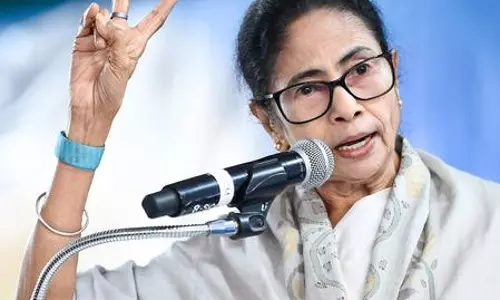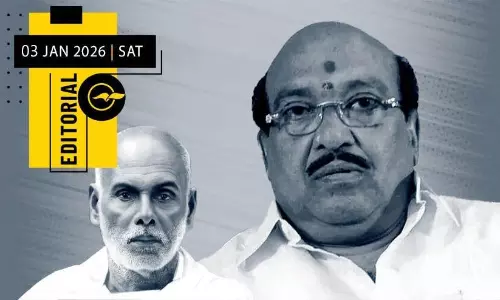
Contempt of Religion or of Reform?
text_fieldsPeace was temporarily restored on Monday after another episode of deadly violence that claimed the lives of ten people in Pakistan notorious for bloody riots and clashes on the issue of blasphemy.
One of the Opposition parties came out with demonstrations alleging that the government committed blasphemy on Islam by altering the wording of the oath in electoral nomination, which the country had adopted in line with religious injunctions. The protests gained momentum with Tehreek-e-Labbaik Pakistan (TLP), the conservative party led by Khadim Hussain Rizvi, blocking the main highways towards the capital starting from November 4. When the demonstrators vandalised public properties aggravating the clashes, the military which had taken control of Islamabad dealt with the protestors severely. But when there came warnings about the violence being likely to spread to other parts of the country, the government succumbed to the demands of the agitators. The first demand of the protestors was met when the Law Minister Zahid Hamid who made changes in a law in the Elections Act 2017 stepped down. The government has decided to agree to bow to the demands of the hardline group such as compensation for the kin of the deceased, the release of all those who have been detained by the security forces since the protests began as well as track down those responsible for amending the law and thereby committing blasphemy. The protest by TLP was then called off. The provisions in the deal that was brokered by Chief of Army Staff General Qamar Javed Bajwa, would be implemented in three days.
It was a recent amendment in the law in the Election Act 2017 that triggered the violence which kept the nation on tenterhooks and brought the capital to a halt for more than three weeks. Controversy has been brewing up since the National Assembly passed the Election Reform Bill 2017. The Opposition had alleged right then that the Bill which allows politicians disqualified from holding public office to lead political parties, was prepared foreseeing the political future of Nawaz Sharif. The very next day after the Bill was passed, Sharif was reinstated as the party head. The latest episodes of violence in the name of blasphemy surfaced even before this hullaballoo had died down. According to the laws currently existing in Pakistan, Muslim candidates contesting in the polls must declare Prophet Muhammad as God’s final Prophet; they do not approve of the concepts and arguments of individuals who oppose this stance and that they are not of Ahmadiyya sect thay belong to the Qadiani/Lahori groups who raise such unIslamic claims.
It was with the argument that this rule, which was framed in line with Articles 62 and 63 of Pakistan's Constitution, was relaxed that Tehreek-e-Labbaik set out on a strike path. Their demands were resignation of the Law Minister, and the restoration of the amended law. But the minister tried to reassure that nothing unconstitutional has been done, and there has been no change to the effect of recognizing Ahmediyyas as Muslims. He produced documents at a press conference to clarify that the only change related to Prophet Muhammad's status as the final prophet is in the wording in the oath from "swear” to "declare", but Khadim Hussain Rizvi and his party were not prepared to accept it. In fact, the parliamentary committee for electoral reforms was formed involving all parties in the country. And the proposals were floated for public debate in December 2016, and later compiled and tabled in the National Assembly unanimously. It was pointed out therefore that the law minister alone could not be made a scapegoat in the issue, but minister Zahid voluntarily resigned and relieved the government of a liability.
Although the reform proposals were elicited and discussed after inviting all parties towards a political consensus, complaints had been pouring in from the Opposition ever since the Bill was passed. But the conservative Barelvi group Labbaik Party harped on the sensitive issue of blasphemy capable of sparking unrest in the country. Since 1990 when all the agitations by various parties raising the blasphemy issue turned bloody, eighty people have lost their lives. Although opposition to the bills was not strictly based on facts, the main Opposition parties were of the stand that the government should take a position first. For the same reason, Islamabad had no alternative but to bend its knees before the demands of the agitators. And on the heels of Labbaik, each other party has warned that it would move the court against the provisions unacceptable to it. Such being the case, every move introduced for the purpose of electoral reforms is likely to be counter-productive.






















